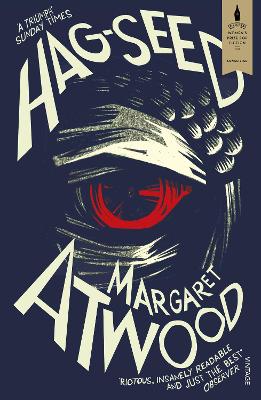
The 'riotous, insanely readable' (Observer) retelling of The Tempest from the 2019 Booker Prize-winning author of THE TESTAMENTS.
‘Riotous, insanely readable and just the best fun...'Observer
Felix is at the top of his game as Artistic Director of the Makeshiweg Theatre Festival. His productions have amazed and confounded. Now he’s staging a Tempest like no other. It will boost his reputation. It will heal emotional wounds.
Or that was the plan. Instead, after an act of unforeseen treachery, Felix is living in exile in a backwoods hovel, haunted by memories of his beloved lost daughter, Miranda. Also brewing revenge.
After twelve years, revenge finally arrives in the shape of a theatre course at a nearby prison. Here, Felix and his inmate actors will put on his Tempest and snare the traitors who destroyed him. It’s magic! But will it remake Felix as his enemies fall?
**LONGLISTED FOR THE WOMEN'S PRIZE FOR FICTION 2017**
- ISBN10 0099594021
- ISBN13 9780099594024
- Publish Date 3 August 2017 (first published 6 October 2016)
- Publish Status Active
- Publish Country GB
- Imprint Vintage
- Format Paperback (B-Format (198x129 mm))
- Pages 320
- Language English
Reviews


Amber (The Literary Phoenix)
- It’s a retelling.
- It’s an uncommon retelling – Shakespeare’s The Tempest.
- It’s a theatre book.
- It’s a revenge book.
- It’s a Margaret Atwood book.
So without even going into the book itself, this was bound to be a winner for me. None of these aspects promise a pure five-star review, but they do promise I won’t be bored. And honestly? I enjoyed Hag-Seed, as a whole.
I think that Margaret Atwood captured the feel of The Tempest so well. There are roundabouts and trickery and malevolent revenge. For those familiar with the original play, it’s one of the only ones that has magic in it – A Midsummer Night’s Dream comes to mind as well – so Atwood was tasked with the challenge of a contemporary retelling and the way so dealt with the magical aspect was fantastic. Theatre is a wonderful setting for something like this, because the arts allow a sort of modern magic. Hollywood would have worked as well, but even this untraditional theatre setting made my heart happy.
You never really… like the characters? I find that’s true of other Margaret Atwood books as well. Felix is a disgruntled man and definitely not someone the reader will probably like, unless they can related because they’ve been similarly slighted. However, he’s such a well-made character. Conniving, angry, broken, and just a little mad. You don’t have to like a character to be interested in them. I found that this was true of other characters as well – Anne-Marie was a particular favorite, but the inmates were also good.
The pacing was a little slow. Again, this is just something I find typically in Atwood’s book. And because of experience, I know it pays off with a sudden burst at the end. The plot builds slowly and is generally kept in only the main character’s head. It’s slow, but it’s interesting.
One thing I thought was interesting about Hag-Seed was that Felix and the players were putting on The Tempest as a musical… and then Atwood worked that into the book. There are a few songs worked into the body of the book. This came across really well in the audiobook, where they were read like raps. It gave a different feel to the book, a whole different level of the experience. Really neat.
Hag-Seed probably wouldn’t be a book I’d pull out to re-read often, but I thought it was a great story and especially a really good retelling. Honestly, if you like The Handmaid’s Tale or Oryx and Crake you’re going to like Hag-Seed. It’s very true to her style and a great book. Revenge stories are always interesting, and this is one that feels like it has levels and you’d see new details the next time you read it.

clementine
This felt very unlike the Margaret Atwood novels I've read before, not the least because she usually writes first person narratives with female protagonists. But one thing I've learned about her is that she dabbles in everything and she does it with finesse.
The main issue I have with Hag-Seed is that parts of it just felt like reading a lecture on The Tempest. Which, you know, I took an entire class on Shakespeare in my undergrad, so that's enough of that. The climax also comes a bit early, with a fair amount of time at the end devoted to more analysis of the play. But that's minor - the book is fast-paced, with short chapters, so even the more tedious parts were perfectly bearable.
Overall, I really enjoyed the framing of this book. The characters weren't super well-developed, but that feels in line with characterization in plays anyway. The choice to set Hag-Seed primarily in a prison was fascinating - not just because it's an obvious reflection of the major themes of the play (made explicit in the novel itself), but because it's a pretty clear political statement about the importance of literacy and theatre in prisons. Atwood is known for her left-wing politics so this type of compassionate view of the rights of prisoners is right in line with that. It didn't feel heavy-handed or preachy though, probably because it integrated perfectly with the plot.
With my knowledge of The Tempest I had a really good time picking up on plot and character parallels. Some of the names were genius. I especially loved Felix/Prospero - different name, same meaning. When I realized that Estelle was Felix's "auspicious star" I was delighted.
Most of the other Atwood novels (and short stories) I've read have been explicitly framed as feminist (or perhaps post-feminist, in the case of Cat's Eye.) That was not a major theme in this book, which I found interesting. In fact, there was a dearth of female characters. But Anne-Marie was physically and emotionally strong and did challenge Felix's paternalistic tendencies as well as the prisoners' view of the inevitability of Miranda's rape, so Atwood definitely got her little feminist jabs in. Which, of course, I appreciate.
A really interesting and unusual retelling, I think - not without its faults, but enjoyable nonetheless.

Jane
I awarded this novel four of five stars because I came away from the book not satisfied, but not dissatisfied, either; because I was not in favor of much of what Felix was doing—how could he not see he was inflicting upon himself the very prisons Prospero inflicted upon himself in The Tempest?
…or is that what The Tempest is about, and I still fail to understand it completely?
Full review at Janepedia: https://janepedia.com/hagseed/

brokentune
Your profanity, thinks Felix, has oft been your whoreson hag-born progenitor of literacy.
When I learned that Margaret Atwood had written a book for the Hogarth Shakespeare series, I was both thrilled and hesitant to pick it up. I love Atwood’s work. I love Shakespeare. However, there are elements of both authors writing that I can see would react like fire and ice.
Atwood is one of my go-to authors for strong female characters. Shakespeare does not come immediately to my mind for that purpose. On the other hand, I love Shakespeare’s thoughtful and often sensitive male characters, which in turn is not something I have really found in an Atwood novel. Most of Atwood’s male characters I’ve encountered were horrid human beings. I mean look at Atwood’s Penelopiad (part of the Canongate Myths Series) to see even the most ancient of heroes being taken down a few pegs. Not that I object – I very much enjoyed her modern deconstruction of the classic story, but I do sometimes feel a little sorry for the male characters that cross her path.
Therefore it is fair to say, I really had some misgivings how Atwood would approach this re-telling of The Tempest, which is packed with men full of ambition, desire, and longings for revenge, and where the only female character, Miranda, is being maneuvered like a chess piece.
I was wrong. Hag-Seed showed that despite their differences, there are also a few things that Shakespeare and Atwood have in common: the ability to come up with a gripping narrative, imaginative ways of explaining the world as they observe it by relating different angles to the unsuspecting reader, a talent for striking a balance between thought-provoking and evocative writing, and best of all an enormous sense of having fun with words.
Readers who may have been put off Shakespeare by having had to sit through endless recitals of famous lines in school may not remember it but Shakespeare was funny. If nothing else, there are memes and objects out there that still thrive on Shakespeare’s appeal to the sense of fun in people. None more so than the Shakespearean insult kit (see here or here for a bit of fun).
Atwood, who can also be wickedly funny, has picked up on this, and actually uses it to lighten up the otherwise potentially depressing or even threatening setting of a prison, where we get to await in anticipation how the inmates will put Shakespeare’s own words to a more creative use. I honestly looked forward to the inmates getting to grips with Shakespeare’s The Tempest by using his own swear words:
“Born to be hanged. A pox o’your throat. Bawling, blasphemous, incharitable dog. Whoreson. Insolent noisemaker. Wide-chapp’d rascal. Malignant thing. Blue-eyed hag. Freckled whelp hag-born. Thou earth. Thou tortoise. Thou poisonous slave, got by the devil himself. As wicked dew as e’er my mother brushed, With raven’s feather from unwholesome fen, Drop on you both. A south-west blow on ye, And blister you all o’er. Toads, beetles, bats light on you. Filth as thou art. Abhorr’ed slave. The red plague rid you. Hag-seed. All the infections that the sun sucks up, From bogs, fens, flats, fall on – add name here – and make him, By inch-meal a disease. Most scurvy monster. Most perfidious and drunken monster. Moon-calf. Pied ninny. Scurvy patch. A murrain on you. The devil take your fingers. The dropsy drown this fool. Demi-devil. Thing of darkness.”
Of course, the investigation into Shakespearean swear words was not the only aspect. I loved. I also loved the scene setting and how Atwood re-imagined the isolation of Prospero’s island in the isolation of the prison, how she transferred the play within the play in The Tempest into a play about a play about a play by making it clear from the outset that Shakespeare’s play The Tempest will be focal point of Felix’s (Atwood’s main character’s) ambition.
I loved how she used the diverse characters to show different interpretations of the original play, and how she transposed issues of colonialism, sexism, privilege, politics, gender issues, and others I haven’t even contemplated yet, from Shakespeare’s work into a modern setting.
So, to anyone, who rolls their eyes at reading Shakespeare because they have been bored to despair with a few lines of his most famous works, I say pick up a copy of Hag-Seed. It is just about one of the most gripping, thoughtful, and entertaining ways to find out why people are still enthralled by his works.
“One question. Is ‘shit’ a curse word? Can we use it, or what?” It’s a fine point, thinks Felix. Technically, “shit” might not be considered a curse word as such, only a scatological expression, but he doesn’t want to hear it all the time. Shit this, shitty that, you shit. He could let them vote on it, but what’s the point of being in charge of this motley assemblage if he refuses to take charge? “‘ Shit’ is off bounds,” he says. “Adjust your cursing accordingly.” “‘ Shit’ was okay last year,” says Leggs. “So how come?” “I changed my mind,” says Felix. “I got tired of it. Too much shit is monotonous, and monotony is anti-Shakespeare.

inlibrisveritas
Hag-Seed is a retelling of Shakespeare’s The Tempest, but you don’t need to know The Tempest or read the other Hogarth Shakespeare books to enjoy this at all. It even has a summary of the play in the back of the book. I love Shakespeare and I love seeing people delve into it and make it their own, because there is so much to work with and Atwood does just that. She creates a retelling of The Tempest within a story that includes a theater director creating his own retelling of The Tempest. I think what really made me enjoy this is that it evokes many of the same feelings and questions that the play itself evokes, especially in terms of Felix’s daughter Miranda.
The play is retold both in the story itself as well as in a play put on within the story, and I think the fact that it’s sort of two retellings in one is pretty brilliant because we get to see two visions of the play come together. I loved how the prisoners changed and adapted The Tempest to really make it into something more fun and easier for them to understand, it includes rap numbers (of which Atwood has written out) and a pretty cool change to Ariel I never thought about. The writing is pretty great and there is a lot of exploration of self going on with Felix that I appreciated, even during his more troubling moments.
Overall I rather like Hag-Seed, it’s a really fun take on Shakespeare that offers a lot of new twists to an old story, and if this is what I can expect from Atwood’s books then I definitely think I’m going to have to give her other novels a try finally.
